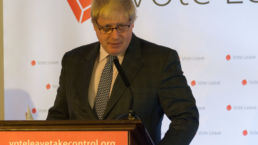Photo credit: CNN
If you ever doubt the importance of words, trying saying 'Make American Great' or 'Let's Take Control'. Deleting two everyday words ('again' and 'back') dramatically reduces the impact of these two well-known phrases.

Language defines our humanity. A big claim, but true.
Other creatures are able to communicate through sound, but only homo sapiens can discuss nostalgia, nuclear physics and the price of tomatoes in Tesco.
Even more remarkable – and important – we have the unique ability to make a permanent record of our words. We write them down. The inimitable William Shakespeare recognised this when, in the brilliant conclusion to Sonnet XVIII, he told his patron, the Earl of Southampton:
So long as men can breathe, or eyes can see,
So long lives this, and this gives life to thee.
And 400 years later, immortalised in the words of the Bard, the Earl lives on.
Even without the genius of Shakespeare, it’s clear that writing is the ultimate human achievement, the cornerstone of civilization, of history, of philosophy, of law, of commerce. It’s the vehicle of all important, permanent communication. That’s why literacy, selecting the right words and setting them down correctly and effectively, really does matter.

Now let’s see how it works.
Task one:
Choosing the right words.
I believe it was Jeremy Clarkson who, when describing a family saloon that had a little something extra, called the car a librarian with a g-string under the tweeds. Simple, but utterly memorable. Moreover, word tricks like that (and it is a bit of trick) are not difficult if you’re prepared to take a little time. Begin with a measure of thought, mix in shot of research, add a splash of imagination – and you’re there. Try it next time. You won’t be disappointed.
Here’s a little tip to help you find the most appropriate language. Imagine all the words you know, all your vocabulary, hangs on pegs in your mind. Lazy writers grab the nearest words, those hanging on the pegs at the front of the mind.
The better writers stretch back and pick more interesting and unusual words hanging on the back pegs.
Task two:
The most effective word order.
Take this simple sentence: ‘The dead pig lay on a barrow.’ Statement of fact, clear, grammatically correct and unambiguous. But hardly inspiring. Now see what the poet Ted Hughes did with it in his poem View of a Pig:
“The pig lay on a barrow dead.”
Wow! So simple yet so powerful. All he did was take the word ‘dead’ and move it to the end of the sentence, where it receives our full attention, concluding the line with a heavy, dreadful and ominous thump.
Again, not difficult to do if you take a little time to play around with the words you first set down.
Task three:
Getting the grammary bits right.
Of course in the great scheme of things it doesn’t matter a hoot whether you say less or fewer items, or whether it’s or its a good idea to take care over punctuation, or whether is weather or a wether. But bear two things in mind.
One, there are people – like them or not – who will judge you by your grammar, spelling and punctuation. And they may be clients whose opinion matters a good deal.
Two, if you don’t get the technical bits right (wright? rite?), you may not be saying what you think you are saying. Thanks to Lynne Truss’s (or Truss’?) wonderful Eats, Shoots and Leaves (aka Eats Shoots and Leaves, the panda joke), many of us are aware of the power of the misplaced comma. The same goes for spelling. If you describe a resort you are marketing as barmy you’ll probably put off tourists who might appreciate its balmy climate.
And you’ll leave your reader confused if you then retort that you couldn’t of cared less.

When it comes to using words effectively, there are no concrete rules. But there are conventions and guidelines. I believe these were best set out over sixty years ago by George Orwell in his essay Politics and the English Language, so I’ll conclude with the words of the master stylist himself:
(i) Never use a metaphor, simile, or other figure of speech which you are used to seeing in print.
(ii) Never use a long word where a short one will do.
(iii) If it is possible to cut a word out, always cut it out.
(iv) Never use the passive where you can use the active.
(v) Never use a foreign phrase, a scientific word, or a jargon word if you can think of an everyday English equivalent.
(vi) Break any of these rules sooner than say anything outright barbarous.
Get in touch to see how Redtorch can make words matter for your organisation 👉 hello@redtorch.co
Alex Ross
I'm a sport-obsessed film lover with a passion for evidence-based marketing. I'm proud to own an agency that's become one of the most trusted in world sport.
My most memorable sporting moment is …
Spectating: Liverpool beating AC Milan in 2005 to win the UEFA Champions League.
I am happiest when …
With family.
The sports person that best represents me is …
Frederik Fetterlein (Danish Tennis player... worth a google).
The three things at the top of my bucket list are …
1. Complete an Ironman for the charity MIND
2. Learn a (new) language
3. Work with the NFL
A quote I try to live my life by is …
"Life is as good as the memories you make."




